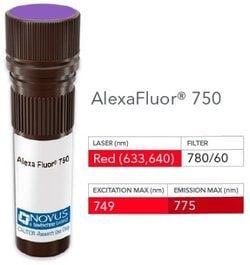ECM-1/Secretory Component P85 Antibody (SPM217), PerCP, Novus Biologicals™
Manufacturer: Novus Biologicals
Select a Size
| Pack Size | SKU | Availability | Price |
|---|---|---|---|
| Each of 1 | NBP234747P-Each-of-1 | In Stock | ₹ 57,494.00 |
NBP234747P - Each of 1
In Stock
Quantity
1
Base Price: ₹ 57,494.00
GST (18%): ₹ 10,348.92
Total Price: ₹ 67,842.92
Antigen
ECM-1/Secretory Component P85
Classification
Monoclonal
Conjugate
PerCP
Gene Alias
ECM1, extracellular matrix protein 1, Secretory Component Glycoprotein, Secretory component p85
Host Species
Mouse
Molecular Weight of Antigen
80 kDa
Quantity
0.1 mL
Research Discipline
Extracellular Matrix, Immunology
Gene ID (Entrez)
1893
Target Species
Human, Rat
Form
Purified
Applications
Flow Cytometry, ELISA, Immunocytochemistry, Immunofluorescence, Immunoprecipitation, Immunohistochemistry (Paraffin)
Clone
SPM217
Dilution
Flow Cytometry
Gene Symbols
ECM1
Immunogen
Secretory Component protein isolated from human colostrum (Uniprot: Q16610 )
Purification Method
Protein A or G purified
Regulatory Status
RUO
Primary or Secondary
Primary
Test Specificity
This monoclonal antibody reacts with a reduction-resistant epitope present in both free and SIgA bound Secretory Component. It does not react with the cell lines lacking secretory component. The antibody is useful for studying the distribution and level of both free and bound secretory component. Secretory component is differentially expressed in epithelium, and the antibody is a popular marker for identifying subpopulations of epithelial cells and epithelial differentiation. The Secretory component antibody is a useful research tool for studying mucosal immunity, inflammation, remodeling, differentiation and tumorigenesis, all processes associated with differential secretory component expression.
Content And Storage
Store at 4C in the dark.
Isotype
IgG1 κ
Description
- ECM-1/Secretory Component P85 Monoclonal specifically detects ECM-1/Secretory Component P85 in Human, Rat samples
- It is validated for Flow Cytometry.

